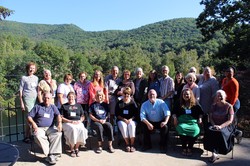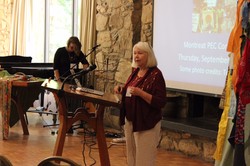The second full day of the Presbyterians for Earth Care 2015 Conference began with a call for change. The Rev. Dr. Patricia (Trisha) Tull led a plenary on creating social movement for change. She said there has never been a climate crisis as unprecedented in earth’s history as there is now. But she adds that the key for true change lies within the mindset of people.
“One of the daunting pieces has not been the understanding of science, but making the human changes or transforming society,” she said. “Social transformation doesn’t begin without a few people stretching to imagine a different world. That transfiguration in action is human metamorphosis.”
Tull, noted author and A.B. Rhodes Professor Emerita at Louisville Presbyterian Seminary, said the church cannot fight the environmental battles alone but must reach across cultural and racial barriers to find common ground. She also pointed to statistics showing white Americans are less concerned about climate change than African American or Latino populations.
Tull added there are three main qualities that environmental activists should cultivate: curiosity to find new things, moral clarity to know what faith and ethics teach and the courage/grit to take action and persevere.
When asked about the challenges and opportunities for the faith community to work with secular environmental organizations, Tull said it is a great opportunity to help one another.
“When clergy show up in robes or stoles to testify on environmental matters, it’s very hard to dismiss them as another environmental fringe group,” she said. “Our expertise is not in science, but speaking with moral clarity. We should take advantage of the fact that environmental groups are increasingly reaching out to us. It is a very important partnership.”
The Rev. Dr. J. Herbert Nelson kicked off the Thursday morning session by picking up where he left off on Wednesday evening, encouraging Presbyterians to reach out to those who suffer the most from environmental crises.

Hunger Action Enablers (HAE’s) share successes, brainstorm ideas and worship together during the PEC Conference in Montreat. —Rick Jones
“We are at a point now that God is saying it is time for us to do something for a world that is messed up and in need of deep spiritual despair,” said Nelson. “People need more than bandages for recovery, they need major surgery and it’s time for the church to become what it ought to be.”
Nelson said the church has spent a great deal of time trying to fix itself when its real calling is to become a wounded healer for the broken, beaten and battered. Building on his Wednesday sermon, Nelson said groups like Presbyterians for Earth Care need to take conferences like this one to hurting communities.
“What would it look like for a conference to convene in a community where toxic waste is being dumped?” he asked. “We need to have a place of learning where we can bring together the seminary, sanctuary and the street to engage in prophetic work.”
Nelson said the church is fighting multiple battles and there is never enough people to help. He added that the time for waiting for people to knock on the doors of the church has passed and that real growth begins when the church reaches out to those in need.
“The action we ought to engage in will only happen when we come face to face with those who wear a disguise of joy, but are struggling every day with pain,” he said. That’s where the church needs to be. That’s where Presbyterians for Earth Care needs to be.”
Nelson concluded his remarks by saying the challenge of the Presbyterian Church today is to be uncomfortable, adding that if no one is uncomfortable when Presbyterians are around, we are not doing our job.
Approximately 150 Presbyterians have been meeting this week at the Montreat Conference Center.

